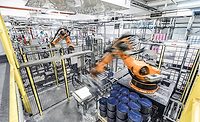Henkel Adhesive Technologies Achieves Sustainability Milestone at Middle East and Africa Sites

Image courtesy of Henkel.
Henkel Adhesive Technologies recently announced that all its manufacturing sites in the Middle East and Africa (MEA) region now operate on 100% renewable electricity, reaching a significant sustainability milestone. The achievement is aligned with Henkel’s 2030+ Sustainability Ambition Framework, which aims for climate-positive operations by 2030 and a net-zero pathway.
Henkel's eight MEA Adhesive Technologies manufacturing sites, located in six countries, have successfully transitioned to renewable electricity sources, eliminating carbon dioxide (CO2) emissions from their electricity usage, also known as Scope 2 emissions. This shift includes on-site solar installations and external renewable sources such as hydroelectric and wind energy. Specific initiatives include renewable electricity derived from on-site photovoltaic (PV) solar and hydroelectricity in Turkey and Kenya, wind energy in South Africa, and solar power in Saudi Arabia and the UAE.
Through this, Henkel has eliminated approximately 10,471 tons of CO2 emissions per year from its Scope 2 activities, equivalent to removing the carbon footprint of around 2,500 gasoline-powered cars driven for one year or c. 2,700 flights from New York to Singapore. Henkel reports that by drastically reducing its reliance on fossil fuels, the company is making a substantial environmental impact and setting a benchmark for the industry.
Veerabhadra Konakalla, head of Safety Health & Environment at Henkel Adhesive Technologies IMEA, said, "By achieving complete decarbonization of our scope 2 operations in our MEA sites, we've turned our commitments into tangible progress on the path to achieving climate-positive operations by 2030. This achievement is a testament to the zeal of our IMEA team to drive transformative environmental change and create a more sustainable future."
Learn more about Henkel at www.henkel.com.
Looking for a reprint of this article?
From high-res PDFs to custom plaques, order your copy today!








